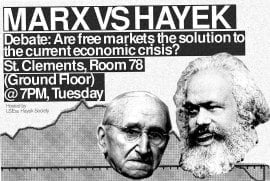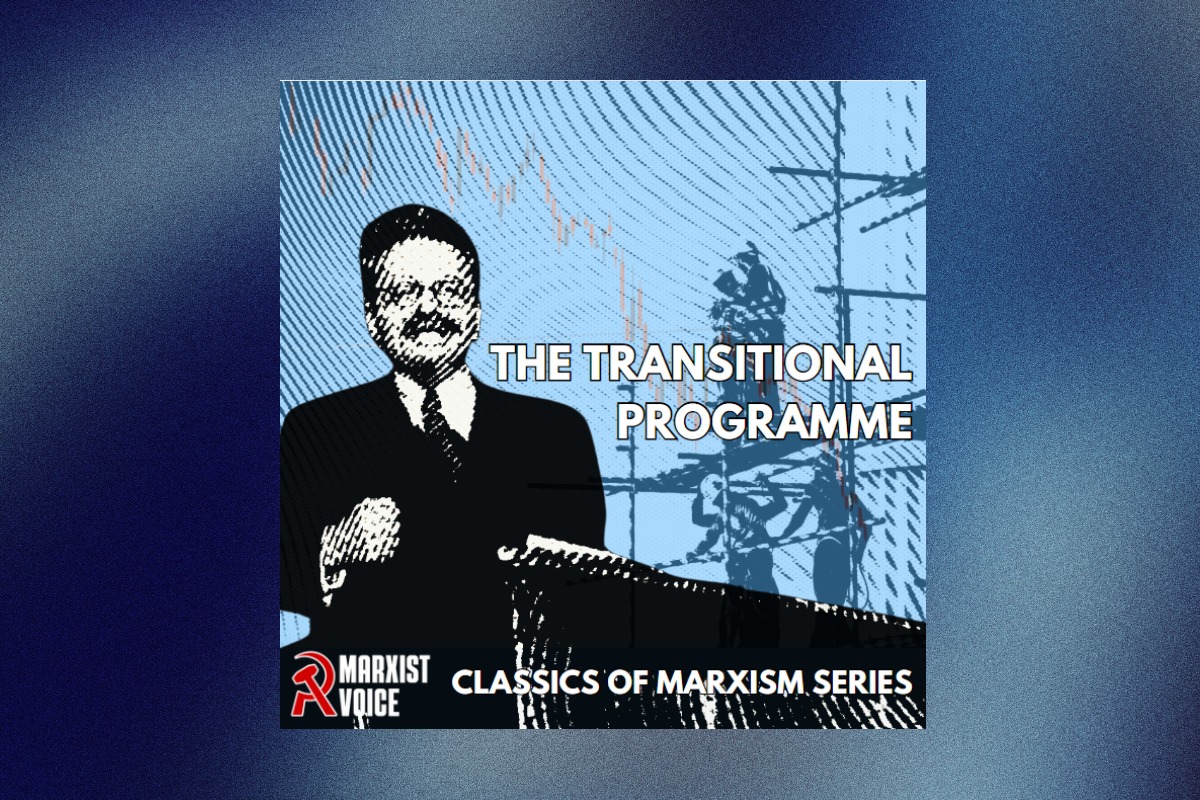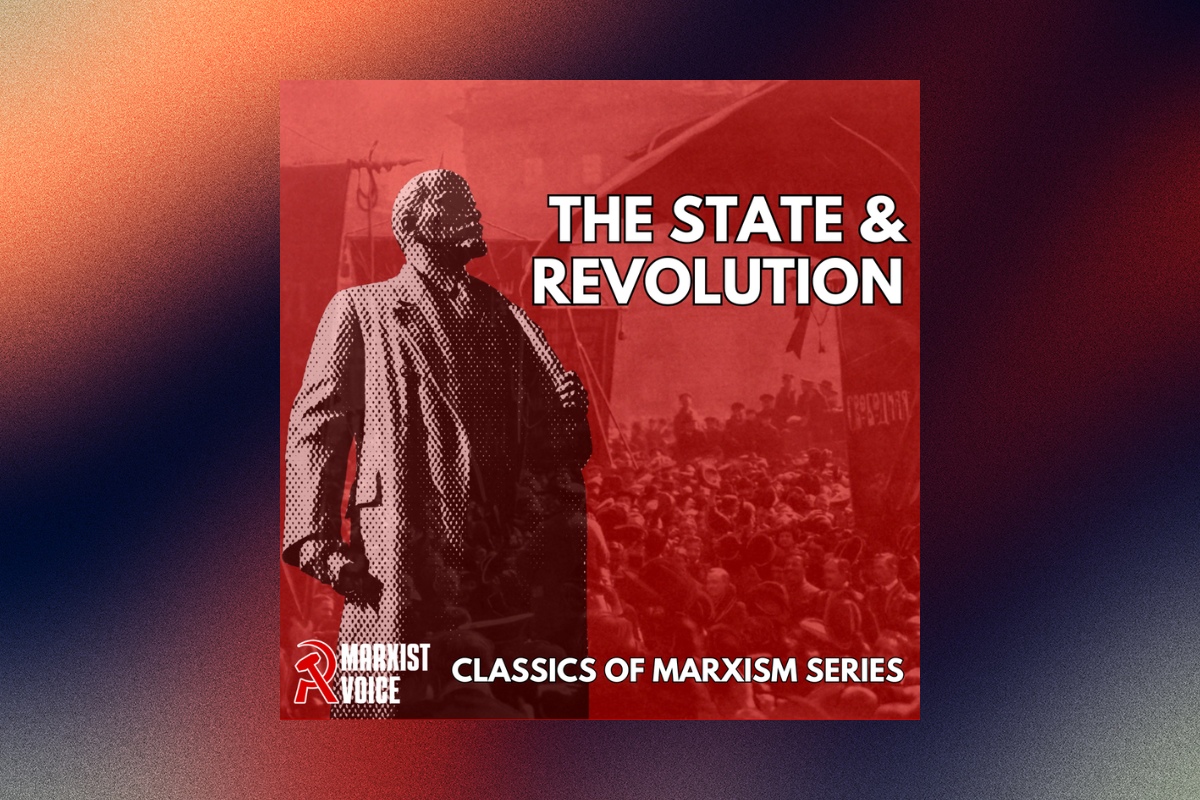We publish here a recording and report of a recent debate held at the London School of Economics between the LSE Marxist Society and the LSE Hayek Society on “Are free markets the solution to the current economic crisis”. Representing the Marxist Society was Adam Booth, editor of www.socialist.net, who provided a Marxist explanation for the current crisis and for capitalist crises in general.
We publish here a recording and report of a recent debate held at the London School of Economics between the LSE Marxist Society and the LSE Hayek Society on “Are free markets the solution to the current economic crisis”. Representing the Marxist Society was Adam Booth, editor of www.socialist.net, who provided a Marxist explanation for the current crisis and for capitalist crises in general.
The crisis of capitalism impacts the universities not only through the government’s brutal cuts on higher education, but also ideologically, as these are the grounds where the next generation of intelligentsia is produced. Every capitalist crisis has led bourgeois economists to question their assumptions. Today’s hegemonic neoliberalism emerged from the crisis of the 70s as a response to the failures of Keynesianism to manage the economy, and as a reaction to the class struggles and movements of the working class at the time.
Keynesianism in turn had developed in the 1930s out of the Great Depression as a way to try and manage capitalism and find a way out of the deep crisis. At the same time as the crisis in the West, there was a profound development of industry under the planned economy in the Soviet Union. Meanwhile, earlier liberal economics, which places faith in the invisibile hand of the free market, and which today’s “libertarians” proudly espouse, had been seen to fail.
Again, today, humanity is at the crossroads. While millions of workers and students around the world are gaining class consciousness through sheer practical experience, this struggle also takes place in the ideological battlefield. It is for this reason that we must arm ourselves with the weapon of Marxist theory, and win students to the side of the working class.
On Tuesday 18th March, the Marxist Society at the London School of Economics (LSE) held a debate with the LSE Hayek Society. This was the first event of the LSESU Marxists. Over 60 students attended, with roughly an equal number of people from each side of the debate, plus a large portion who initially raised their hand for “undecided”. The debate lasted around two hours, starting with 15 minute opening speeches on each side plus five minute responses, followed by a lively debate from the audience and final conclusions from the speakers. After the official debate a large group moved onto the pub where the unofficial discussion continued!
Instead of offering an analysis of the roots of the crisis, the Hayekians opened the debate by claiming that Marx’s Labour Theory of Value has been destroyed by the Subjective Theory of Value (STV, also known as Marginal Utility Theory). With respect to the theory of value, the Hayekians share much with mainstream neo-classical economists. For them, value is not something objective, determined by socially necessary labour time (the amount of labour necessary to produce a given commodity, given the average productivity of labour in that society), but simply by the individual’s subjective valuation or preferences.
From this analysis of the STV, it follows that the market is a democratic realm, shaped by the desires of millions of individuals. Any shortcoming of the market, for the Austrian School of economics represented by Hayek and co., is due to unions, governments, and movements that aim to restrict the invisible hand and the forces of supply and demand.
Thus the Hayekian explanation for the current economic crisis amounts to simply blaming the regulation of governments and central banks: “If only governments and central banks had let the market do its magic, instead of printing money and encouraging loans through low interest rates,” complains the vulgar economist. But credit in the past decades wasn’t employed arbitrarily: loans were given to ordinary working households so that they could purchase goods to make up for the squeezing of wages imposed on them by the capitalists. Credit was a way to artificially expand the market in the short term and thus delay the looming crisis of overproduction (or as the bourgeois economists call it, “excess capacity”), which has now come back to haunt us in the past six years of recession and stagnation.
“The real barrier of capitalist production” as Marx put it, “is capital itself”. The source of crisis is not external to capitalism, but comes from its very core: production not for human need, but for profit. In short, this profit is the surplus value produced by the working class: while workers receive wages, these wages are necessarily less than the value of their labour. The remaining value of this work, once it is realised by selling commodities on the market, is either reinvested into production or pocketed by the capitalist.
The issue is that, since the working class constitutes the vast majority of the population, the people who are exploited are the same people who need to buy the commodities produced. But because the value they receive in wages is necessarily lower than the value they need to purchase, commodities aren’t sold, and production halts, as capitalists can no longer realise a profit. Paradoxically, as if it were making a mockery of civilisation, capitalist society has produced too much, and enters a crisis of overproduction.
At this point we must ask: why isn’t capitalism always in crisis? Overproduction is avoided through globalisation by expanding the world market, and finding new sources of profit; by investing in new technology, which cheapens the cost of commodities; and especially by issuing credit, which allows for the market to be artificially expanded. All these “solutions’, however, only postpone and worsen the crisis, as we have witnessed in the past years. Debt accumulates, and must eventually be paid off, while machinery, unlike the labour it replaces, doesn’t possess the ability to consume. Furthermore, as machines replace workers, the rate of profit falls in the long run, since it is only labour, not machines, that produce value.
Another point that came up regularly in the discussion was that pitting the centralised state and the market against each other – as the Hayekians do – is objectively and historically incorrect, as the two developed together in a dialectical relationship. Not only is it class society (and therefore society where a market of commodities existed) that first gave rise to the state as an organ for the ruling class to oppress the working class, but the state has always played a large role in fomenting the development of the market, including in the infancy of capitalism itself. In fact, the original capital for investment was accumulated through the pillage of the colonies, and, domestically in England, through the murderous enclosure acts, that were so essential for the development of capitalism.
Likewise, centralisation – the formation of monopolies that are increasingly intertwined with state power – is not inimical but essential to the market, as competition between firms inevitably leads to the concentration of capital, with smaller capitals being outcompeted and absorbed by the largest. To long for a return to a time when the productive forces were dispersed between millions of private owners is the same as wishing for a return to the hand loom. The only way forward from here is to take these massive globalised and monopolised industries and to transfer their ownership from private to public hands, under democratic workers’ control.
Ultimately, the weakness of the Hayekians to argue their points was due to their idealist world outlook, in comparison to the historical materialist methodology of the Marxists. For the former, economic crisis is not rooted in systemic causes, but in the ideas and alleged stupidity of government policy-makers. Likewise, their solution to the crisis is but a utopia borne out of the imagination. Ours is the opposite: scientific socialism lies in the concrete contradictions of class society, the class struggle and the lessons from history.





